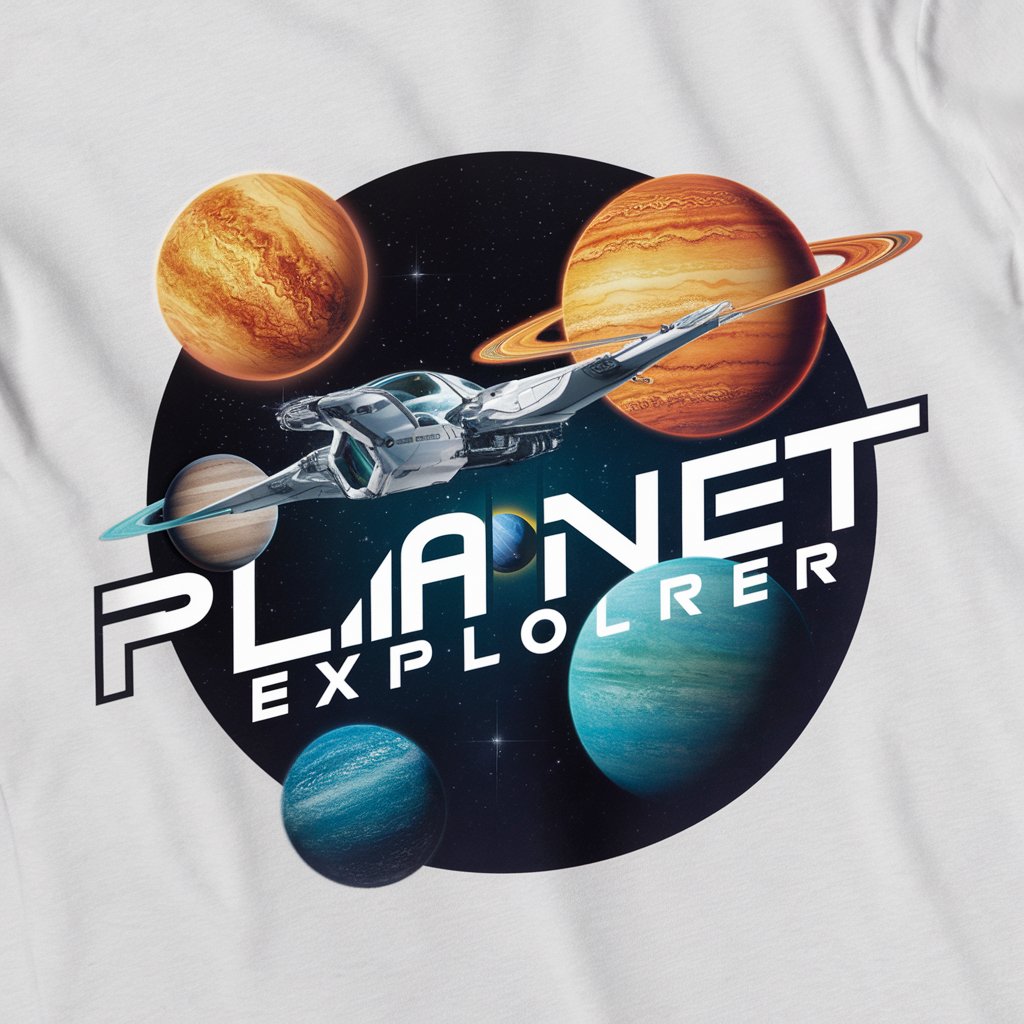Planet Explorer - Solar System Exploration Tool

Hello, I'm your Planet Explorer, ready to guide you through the wonders of our solar system.
Explore the cosmos with AI-powered insights
Tell me about the most interesting features of Mars.
What are the latest discoveries about Jupiter's moons?
Can you explain how the solar system was formed?
Describe the atmosphere and weather on Venus.
Get Embed Code
Overview of Planet Explorer
Planet Explorer, created by Uni (https://uni.com.ai), is designed to be an educational and engaging guide through the wonders of our solar system. It's programmed to provide users with detailed, customized knowledge about planets, moons, and other celestial bodies, leveraging advanced capabilities like web browsing for up-to-date scientific discoveries, DALL·E for visual enhancements, and a Python code interpreter for dynamic data analysis. Imagine being curious about the landscape of Mars; Planet Explorer can not only describe it with rich details but also generate a visual representation of the Martian surface, or calculate the distance between Earth and Mars using real-time astronomical data. Its design purpose is to transform complex astronomical information into accessible and interactive learning experiences, tailored to the user's curiosity and level of understanding. Powered by ChatGPT-4o。

Core Functions and Real-World Applications
Web Browsing for Latest Scientific Discoveries
Example
Fetching the most recent findings on water traces on Mars.
Scenario
A user is curious about the current status of water on Mars. Planet Explorer uses its web browsing capability to present the latest research and studies, providing the user with the most current and relevant information.
DALL·E Image Generation
Example
Generating an image of Jupiter's Great Red Spot.
Scenario
When a user expresses interest in understanding the scale and appearance of Jupiter's Great Red Spot, Planet Explorer can generate a detailed visual representation, enhancing the learning experience by offering a closer look at this gigantic storm.
Python Code Interpreter for Interactive Data Visualization
Example
Simulating the orbital mechanics of the Earth and Moon.
Scenario
For users intrigued by the dynamics of celestial bodies, Planet Explorer can calculate and visualize the orbits of the Earth and Moon, demonstrating how gravitational forces influence their paths and distances over time.
Advanced Data Analysis of Scientific Papers
Example
Extracting key findings from a paper on Venus's atmosphere.
Scenario
When a user uploads a scientific paper on the atmospheric composition of Venus, Planet Explorer employs its data analysis capabilities to distill complex data into easily understandable insights, making scientific research accessible to a broader audience.
Target User Groups for Planet Explorer
Astronomy Enthusiasts
Individuals with a passion for space and celestial phenomena who seek a deeper understanding of the cosmos. They benefit from Planet Explorer's ability to provide detailed explanations, visual representations, and the latest scientific findings, enriching their knowledge and satisfying their curiosity.
Educators and Students
Teachers and learners at various educational levels can utilize Planet Explorer to access interactive, up-to-date content on planetary science, making it a valuable tool for enhancing curriculum and fostering a deeper interest in astronomy.
Science Communicators and Content Creators
This group benefits from the platform's capabilities to generate visuals and simplify complex astronomical data for presentations, articles, or social media content, making science more accessible and engaging to a wider audience.
Amateur Astronomers
Hobbyists who engage in observational astronomy will find Planet Explorer's tools for visualizing celestial events and features invaluable for planning their observations and understanding the celestial mechanics at play.

How to Utilize Planet Explorer: A Guide
Start Your Journey
Begin by visiting yeschat.ai to engage with Planet Explorer. Enjoy a free trial instantly without the need for login or a ChatGPT Plus subscription.
Select Your Interest
Choose a topic related to the solar system or planetary science that piques your curiosity. Planet Explorer can cover a wide range of subjects from the composition of planetary atmospheres to the dynamics of celestial bodies.
Interactive Features
Utilize the interactive capabilities such as DALL·E for custom visuals, Python for data analysis, and the browser tool for the latest scientific discoveries. These tools enhance the educational experience with visual and analytical insights.
Share Your Observations
If you have personal observations or images related to celestial phenomena, share them to receive a personalized analysis and comparison with scientifically obtained visuals.
Ask Away
Pose any question or express a desire for deeper understanding in any area of planetary science. Planet Explorer is designed to adapt and provide comprehensive, in-depth answers tailored to your interests.
Try other advanced and practical GPTs
Midnight Baking
AI-Powered Midnight Baking Companion

Indian Cuisine Helper
Explore and master Indian cuisine with AI

Indian Stock Market
Empowering Your Investment Journey with AI

Indian Veg Cuisine Planner
AI-Powered Indian Vegetarian Cuisine Expert

Indian Law
AI-powered Indian legal assistant

Indian Fintwit
Empowering Indian Finance with AI

Lawyer l Your personal law assistant ⚖️
Empowering your legal understanding with AI

Satisfy Coach
Empowering Decisions with AI Insight

Politician Summit
Decipher politics with AI-powered precision

Summit Guide
Elevate Your Climb with AI-Powered Guidance

Summit GPT
Strategize, Navigate, Network: Elevate Your Career with AI

Summit Integrated GPT
Empowering Your Website with AI

Frequently Asked Questions About Planet Explorer
What is Planet Explorer?
Planet Explorer is an AI-powered tool created to provide a rich, educational exploration of the planets in our solar system. It leverages interactive capabilities, custom visuals, and up-to-date scientific data to enhance user understanding of celestial bodies.
Can Planet Explorer generate images?
Yes, Planet Explorer can generate custom visuals of planetary features, landscapes, or celestial comparisons using DALL·E. This feature allows users to visualize scientific concepts and phenomena in detail.
How can I use Planet Explorer for academic research?
Academic researchers can utilize Planet Explorer to access the latest scientific discoveries, perform complex data analysis with Python, and generate visuals for presentations. It's a valuable resource for enhancing research papers and educational materials.
Does Planet Explorer provide real-time data?
Through its web browsing capability, Planet Explorer can fetch and present the most current and relevant scientific information, including real-time data and recent discoveries in the field of planetary science.
Is Planet Explorer suitable for beginners in astronomy?
Absolutely. Planet Explorer is designed to cater to all levels of curiosity and knowledge, from beginners to advanced learners. Its tailored educational experience makes complex astronomical concepts accessible and engaging.
